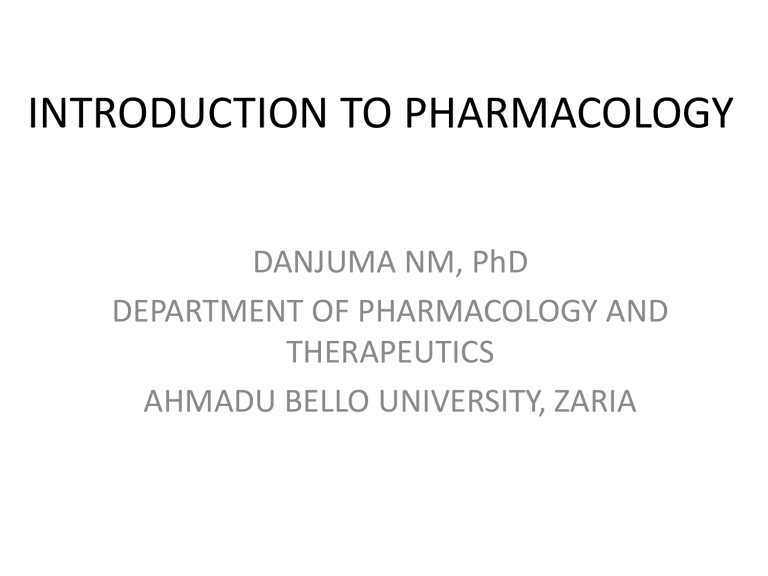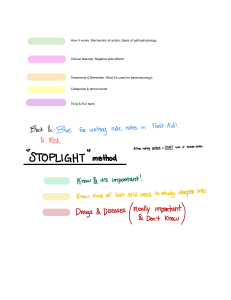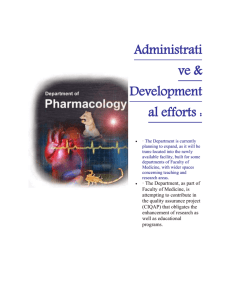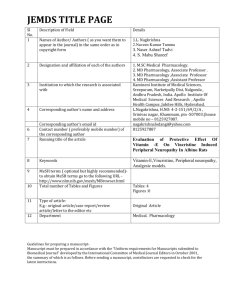
INTRODUCTION TO PHARMACOLOGY DANJUMA NM, PhD DEPARTMENT OF PHARMACOLOGY AND THERAPEUTICS AHMADU BELLO UNIVERSITY, ZARIA What is Pharmacology? • “Pharmacon” – drug; “legein” – to speak • Broadly defined as the study of how chemical agents affect living processes. Hormones Neurotransmitters Growth factors Local autocrine factors Drugs (pharmaceuticals) Toxic agents in the environment Historical perspectives Idea Claudius Galen (129–200 A.D.) “The empiricists say that all is found by experience. We, however, maintain that it is found in part by experience, in part by theory. Neither experience nor theory alone is apt to discover all.” The Impetus Theophrastus von Hohenheim (1493– 1541 A.D.), “If you want to explain any poison properly, what then isn‘t a poison? All things are poison, nothing is without poison; the dose alone causes a thing not to be poison.” Early Beginnings Johann Jakob Wepfer (1620–1695) “I pondered at length. Finally I resolved to clarify the matter by experiments.” Foundation Rudolf Buchheim (1820–1879) “The science of medicines is a theoretical, i.e., explanatory, one. It is to provide us with knowledge by which our judgement about the utility of medicines can be validated at the bedside.” Consolidation – General Recognition Oswald Schmiedeberg (1838–1921) Fundamental concepts such as structure-activity relationship, drug receptor, and selective toxicity emerged from the work of, respectively, T. Frazer (1841– 1921) in Scotland, J. Langley (1852– 1925) in England, and P. Ehrlich (1854–1915) in Germany. Alexander J. Clark (1885–1941) in England first formalized receptor theory in the early 1920s by applying the Law of Mass Action to drug-receptor interactions. Together with the internist, Bernhard Naunyn (1839–1925), Schmiedeberg founded the first journal of pharmacology, which has since been published without interruption. The “Father of American Pharmacology”, John J. Abel (1857–1938) was among the first Americans to train in Schmiedeberg‘s laboratory and was founder of the Journal of Pharmacology and Experimental Therapeutics (published from 1909 until the present). Others.. • Virchow (cell theory, 1868) • Louise Pasteur (bacteria as a cause of disease, 1878) • Freidrich Serturner (purified morphine from opium, 1805) Study areas: • Pharmacokinetics • Pharmacodynamics • Biochemical pharmacology • Molecular pharmacology • Chemotherapy • Systemic pharmacology: o Cardiovascular pharmacology o Neuropharmacology o Immuno-pharmacology……. Divisions: • • • • • Psychopharmacology Clinical pharmacology Veterinary pharmacology Toxicology Medicinal chemistry… Scope: • • • • • Biotechnology Pharmacogenetics Pharmacogenomics Pharmacoepidemiology Pharmacoeconomics Some terminology: • Target for drug action • Receptors • Agonist (partial, full) • Antagonist • Efficacy • Potency Terminology… • Critical threshold • Maximal effect • Onset of effect • Duration of effect Sources of drugs: • Plants • Animal • Minerals Factors influencing drug response: • Route of administration • Presence of other drugs (potentiation, accumulation etc) • Age (pen G in adults 6 hrly; neonates 12 hrly) • Body weight Factors influencing drug response… • Gender (morphine and barbiturate cause paradoxical response; excitement in females) • Environment (DDT, cigarette, alcohol-induce microsomal enzymes and increase metabolism) • Genetic (slow and fast acetylators of INH; increased incidence of peripheral neuritis) Factors…. • Pathological state (chronic liver diseasereduced metabolism; renal failure-clearance of drug is impaired) • Tolerance (acquired, natural or specie dependent; blacks are tolerant to mydriatics, rabbits tolerate large doses of atropine} Factors… • Dependence (psychological or physical; repeated use brings physiological changes in body and require continued presence to maintain normal function



